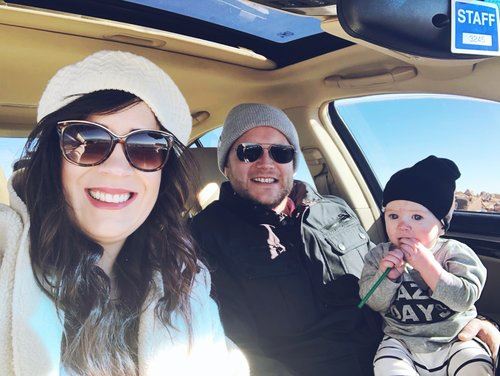What Are the 5 Love Languages?
Marriage


Audio By Carbonatix
5:00 AM on Friday, October 31
By Brittany Rust, Marriage
The expression of one’s love and how they receive it was made clearer when pastor Gary Chapman published the book, The Five Love Languages. In this groundbreaking resource, Chapman identified five languages of love; essentially, how people receive and share love. By understanding where you fall and where the people you love identify, you can connect more deeply in your relationships. Understanding how those you care about feel loved will empower you to show them love in the most meaningful way. Dr. Chapman backs up this observation with over 25 years of research. Human beings, he proposes, each have a primary love language—the way they best give and receive love.
My husband and I are on very different pages when it comes to how we share and receive love. Whether we are recovering from a fight, experiencing grief, or just want to show some love, we’ve learned over the years it takes a little understanding and growth to reach each other. For my husband, he desires words of affirmation and acts of service. He longs to connect emotionally through conversation and really appreciates when those words are backed up with action. For me, I crave quality time and physical touch, so I’m all about snuggling up on the couch together when I want to connect.
When we first started dating, we learned quickly that we received love differently. Which meant, we had to recalibrate how we showed love to each other. Ryan didn’t feel loved when I held his hand in silence, as I would enjoy. I had to develop the ability to speak tenderly to his heart and show him I meant it. He had to learn that talking it out didn’t make me feel cared for, so reaching out to hold me or carving out time to be with me went a long way.
Let’s explore each love language and as we do, identify the one or two languages you speak and those that the ones closest to you speak.
Love Language 1: Acts of Service
The acts of service love language is happily doing things you know your spouse would like you to do or helping your mate with tasks that need to be done. Examples might include keeping the house clean, putting the toilet seat down, ironing, changing diapers, cleaning the garage, cooking or going out for dinner, or attending a symphony performance. Such acts require thought, time, planning, and effort. They are done in love - not fear, guilt, resentment, or duty - and may go against social or family stereotypes.
This love language values action; it feels the love when served through helpful acts of kindness. Perhaps your spouse feels most loved when you run some much-needed errands, clean up after dinner, or help the kids with their homework so they can take a little time for self-care. For some, this love language is very much appreciated and shows immense love.
I will say this: I’ve never been an "acts of service" kind of gal until I became a mom. It’s still not a dominant language, like physical touch and quality time, but becoming a parent makes acts of service much more appreciated. For both my husband and myself. I would venture to say that as a parent, this love language becomes valuable for both the mother and the father. So, don’t forget to add a little of this love into your marriage if you have children.
Love Language 2: Physical Touch
The physical touch love language is communication of your love through the body's nerve endings, with sensitivity to what methods, circumstances, and timing your spouse finds pleasant. It includes hugs, kisses, hand holding, back rubs, sitting close, hair stroking, and, of course, regular sexual intercourse. It also encompasses long, empathetic embraces and tender touches of understanding when your spouse is in tears or times of crisis.
This language is all about the feels. It doesn’t require much extra time or thought, but rather takes intentionality. If the one you love values touch, it’s the little things that speak loudly. A simple kiss before leaving the house for work and one when you return. A touch on the shoulder as you walk across the room. Holding hands in the car. Each of these simple gestures will make some feel more loved than anything else in the world. If your spouse craves this, be mindful. Without regular touch, they may feel unloved and withdraw. If you identify touch as your language, don’t be afraid to initiate or communicate your need for it.
Love Language 3: Receiving Gifts
The receiving gifts love language refers to tokens or symbols of affection, caring, remembrance, and thoughtfulness. They may be tangible gifts - little (or big) presents that you've found, made, or purchased, given either at a special time or for no specific occasion; or gifts of self - your physical presence in important moments or times of crisis.
For some, feeling loved comes in the form of a gift. Whether big or small, this gesture will speak volumes. It often doesn’t matter what it is or how much it costs, either. For the receiver, it’s the thought that counts. A gift shows your partner or loved one that you thought of them. That you intentionally carved out margin in your life to show them just how much love you have.
If this language is not natural for you, just remember it doesn’t matter so much what it is, but rather that you thought of even giving him or her something. If you value this love language, share that with your spouse. Let them know so they can speak to your heart the way it longs to be spoken to.
Love Language 4: Words of Affirmation
The words of affirmation love langue is verbal expressions of appreciation, compliment, praise, and thanks, conveyed for the well-being of the one you love. Such communication demonstrates: encouragement - it inspires and motivates (not pressures) another to pursue a latent interest or achieve personal potential; kindness - it encompasses loving tones and truthful statements to build intimacy, express understanding, share difficult feelings, or show forgiveness; and humility - it requests instead of demands, asks instead of nags.
People who speak this love language value communication. They adore words. They want to hear how they are valued and that they are understood. They may want to hear compliments and be told, “I love you!”
One thing to note about this love language is that it requires a bit more uncovering if your spouse values it because there are many dialects of this language. For my husband, it’s not necessarily the compliments that make him feel loved but rather open communication of feelings. It’s responding to his thoughts and feelings in a way that makes him feel understood and cared about. But for some, it’s the compliments they crave. If someone you love values words of affirmation, find the dialect they speak and learn to speak that way in return.
Love Language 5: Quality Time
The quality time love language is focused, undivided and uninterrupted attention, despite busyness and business. It is demonstrated in: togetherness - not just proximity, but the simple emotional connection and enjoyment of being with each other; meaningful conversation - sympathetic (not just solution-oriented) dialogue and active listening to share feelings, thoughts, and desires in a friendly uninterrupted context; and shared activities - doing things together that interest one or both of you just in order to create a unique experience and mutual memory.
This love language isn’t necessarily about the amount of time spent together, but rather the quality of it. For example, I need time with my husband one-on-one. That may look like regular dates together, a weekend getaway (doesn’t matter where), or a walk in the evening. I feel loved when we get to just simply be together, the two of us, intentionally focusing on one another. If your spouse or child craves time with you, remember that it means quality time. Not sitting on the couch together watching tv but being together for a period of time that puts the focus on each other.
Now remember, just because you feel loved in one area does not mean those you love speak the same language. It’s important to identify what makes those closest to you feel most loved and be intentional about showing them your love for them in that way. If you continually try to speak to them in your language, chances are they will often feel unloved. And don’t forget to communicate your language in return so that your spouse or family knows how best to speak your love language.
To discover your own love language, take the 5 Love Languages Quiz.
Related Resource: Why Marriage Isn’t 50/50 or 100/100
In this episode of Team Us, we unpack the popular myth that marriage is a 50/50 relationship. But we aren’t stopping there. We’ll also talk about how the counter to this 50/50 myth — that marriage needs to be 100/100 — isn’t always realistic either. If this episode helps your marriage, be sure to subscribe to Team Us on Apple or Spotify so you never miss an episode.
 Brittany Rust has a passion is to give encouragement to the world-weary believer through her writing, speaking, and podcasting. She is the author of Untouchable: Unraveling the Myth That You're Too Faithful to Fall, founder of For the Mama Heart, and hosts the Epic Fails podcast. Brittany, her husband Ryan, and their son Roman make their home in the Rocky Mountains, pursuing outdoor adventures, great food, and memorable stories together. Learn more at www.brittanyrust.com.
Brittany Rust has a passion is to give encouragement to the world-weary believer through her writing, speaking, and podcasting. She is the author of Untouchable: Unraveling the Myth That You're Too Faithful to Fall, founder of For the Mama Heart, and hosts the Epic Fails podcast. Brittany, her husband Ryan, and their son Roman make their home in the Rocky Mountains, pursuing outdoor adventures, great food, and memorable stories together. Learn more at www.brittanyrust.com.
RELATED: Ways Your "Love Language" Affects How You Experience God's Love
Photo credit: ©Getty Images/monkeybusinessimages

























